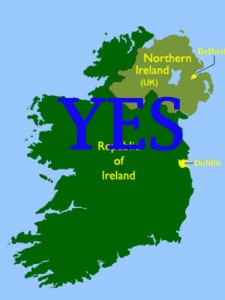Lord Trimble has warned that a YES vote for Independence in Scotland could destabilise the peace process in Northern Ireland as it may increase pressure for a similar referendum to be held there also. He did concede that the democratic movement for constitutional change in Scotland was a potent model for republicans in the Six Counties. Indeed, it is the one which Gerry Adams and his party have successfully engaged with for the last twenty years. In an interview with a Sunday Paper, Trimble claimed to be worried that it would change the political dynamic by placing the United Ireland issue centre stage. He showed little concern for any potential reaction seven years ago when, wearing an Orange Sash, he triumphantly jigged, hand-in-hand with Paisley, through a Nationalist area on the Garvachy Road. To some dispassionate observers, the award of a Nobel Peace Prize to Trimble, made Henry Kissinger look a most deserving recipient.
Northern Ireland was born and emerged from a threat of violent opposition by an armed, Protestant Volunteer Force to Ireland’s YES response for Gladstone’s Home Rule Bill. British Tories capitulated to them after the First World War and passed the Government of Ireland Act, partitioning many republicans in an artificial statelet. The Border has remained a critical issue for both sides since Northern Ireland was established.
The Acts of Union, 1706, on the other hand, were passed by the Parliaments of both England and Scotland. It was a union of two crowns, since they had shared a Monarch and was based in London. It was not welcomed by all citizens and there were reports of powerful, vested interests and bribery being part of the settlement. What Burns would dub ‘Such a parcel of rogues in a Nation’. Ireland, the third of the “sister kingdoms”, was not included in the Union. It remained a separate kingdom and, indeed, was legally subordinate to Great Britain until 1784.
Since the Seventies, there has been a democratic deficit in Scotland whenever a Tory administration, or, as is currently the case a Conservative-led coalition,ruled in Westminster; in effect, the country was governed by a party that it did not elect. Scotland has been on a journey since 1970 and the reference points are not what is sometimes referred to as narrow nationalism or separatism, they are a quest for the people of a nation to be able to take those decisions which affect their well being and everyday lives.
A strong bond has always existed between Scotland and Ireland and, from this perspective, there is absolutely no reason why that should change. I can, however, understand the alarm which is being felt by some Unionists in the Six Counties as their UK fragments. The majority there at present wish to remain citizens of the United Kingdom and I assume that will remain their view post an Independent Scotland, whatever England and Wales choose to call themselves. That will be respected by the Government in Scotland which will also want to maintain its links with the Dublin Government. Others will know better than me what impact a YES vote might have on the attitude of the Dublin Administration towards the Six Counties. It will most certainly be interesting, since there is every likelihood that it will be a Sinn Fein coalition; that will mean, of course, that a party, committed to Irish re-unification, will be in Government both North and South.
Lord Trimble’s worst nightmare .

Interesting point often missed (or deliberately ignored) by the Scottish “No” campaign. The Act of Union 1707 was a unification of the parliaments. The Union of the Crowns took place in 1603 when the Scottish king took over the English throne.
For the 104 years in between those events, there was a politically independent Scotland as part of a United Kingdom – and that is, in effect, the position to which we would revert following a “Yes” vote in September.
Class blog, John – 10/10. I’m distracted at the mo by the GA rolling story but I’ll come back and burgle your good ideas if that’s OK. I will of course acknowledge the sole progenitor…Go raibh cead maith agat.